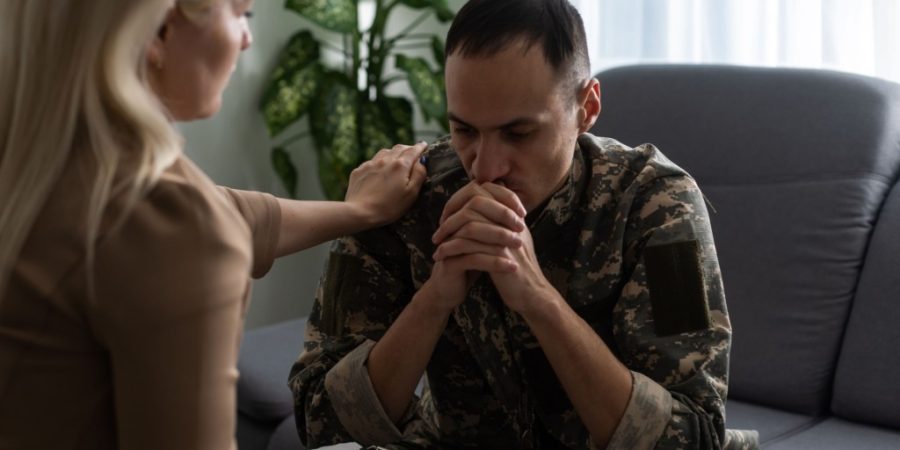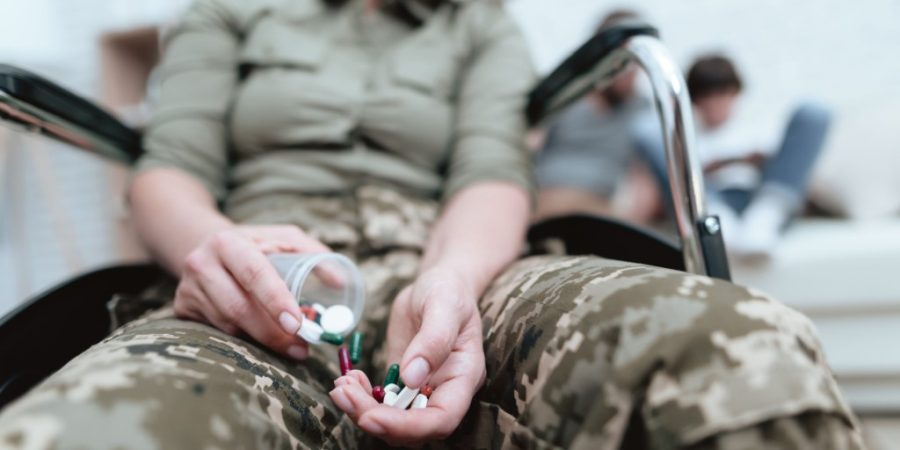
Hydrocodone addiction is a pressing issue for veterans who rely on prescription opioids for their pain management plans. Unfortunately, even misusing prescription hydrocodone on occasion can quickly spiral into an addiction. And if you suspect that you or a veteran in your life has developed an addiction to hydrocodone, then learning to recognize the signs of a drug habit forming is crucial.
Before approaching someone you believe might have an issue, consider familiarizing yourself with the behavioral and physical signs of hydrocodone addiction. Knowing what to look for regarding addiction can help you make informed decisions when it’s time to get help.
Table of Contents
What to Know About Hydrocodone


Knowing more about hydrocodone and why it’s a commonly abused drug can give you insight into the reasons so many people, particularly veterans, are at risk of developing an opioid addiction.
Like other opioids, hydrocodone functions by binding with opioid receptors throughout the brain and body. The primary effect is to block pain signals from being transmitted to the brain, which creates the pain-relieving effect that hydrocodone is prescribed for. However, this same process also creates feelings of euphoria, which can lead to prescription misuse and subsequent prescription drug addiction.
This is how many veterans develop a hydrocodone addiction. Not through poor choices or lack of character, but by seeking pain treatment for a combat injury. Moreover, issues like untreated post-traumatic stress disorder can compound veterans’ risk for developing a substance use disorder. But over time, hydrocodone addiction can shift into reliance on other opioids like morphine and heroin. That’s why it’s important to quickly identify the signs of opioid addiction and, if necessary, seek professional help that’s tailored to military personnel.
Signs of Hydrocodone Addiction in Veterans
Hydrocodone addiction can present with both physical and behavioral signs. Or, in other words, opioid abuse can show in both a person’s body and in their thoughts and behaviors.. To better understand how hydrocodone addiction presents in people, it’s important to look at both of these types of opioid addiction symptoms.
Behavioral Signs of Hydrocodone Addiction
Addiction can radically change the behaviors of an individual, even if they try to retain their personality and behaviors. This is because over time, addiction alters the brain reward system so that the only thing that feels satisfying is using more of the drug. As a result, behaviors of a veteran with a hydrocodone addiction can include:
- Neglecting their family and friends
- Constantly lying to their loved ones
- Stealing from friends and family members
- Becoming angry over minor things
- Having trouble at work or school
- Indifference about the world around them
- Mood swings from sadness to joy
A person’s tolerance to the effects of hydrocodone builds up over time. Eventually, this will lead to people needing more of the narcotic to keep withdrawal symptoms from getting unbearable. During this stage of addiction, the physical signs of hydrocodone addiction may become more obvious and pronounced.
Physical Signs of Hydrocodone Addiction
Over time, opioid addiction can take a toll on the body. Not only do behavioral symptoms lead to neglect of one’s body, but opioids physically alter the chemistry of the brain, which can result in a variety of physical symptoms of addiction.
The most significant physical signs of hydrocodone addiction are:
- Weight loss
- Irregular sleeping patterns
- Constricted pupils
- Nausea and vomiting
- Lack of personal hygiene
- Poor motor skills
In some cases, the physical signs of opioid addiction can be easier to spot than some of the behavioral symptoms. For this reason, viewing both side-by-side can help determine if your loved one has become addicted to their prescription medication.
The good news is that for veterans struggling with an addiction to hydrocodone or any other opioid, there are ways to get help from people who understand.
How Veterans Can Beat Opioid Addiction


At Hero’s Mile, your safety is our number one priority. That’s why our drug and alcohol detox program will keep you safe during the vulnerable early stages of recovery. During this time, you will be under the supervision of addiction specialists, physicians, and trained mental health counselors for your duration here. With constant medical monitoring, our team will help you safely navigate any and all hydrocodone withdrawal symptoms.
But recovery doesn’t stop at medical detox. Just like there are physical and behavioral signs of opioid addiction, recovery requires both mental and physical treatment. And while detox addresses the physical side of addiction, our residential rehab program for veterans is where we treat the mental and behavioral processes that underlie addiction.
Because we are a veteran-exclusive rehab, you can trust that people around you will understand what you’re going through. And with many veterans on staff, you’ll be surrounded by people who both understand addiction and mental health treatment as well as your experiences. With a variety of evidence-based programming like cognitive behavioral therapy, support groups, and family therapy, we can help you overcome hydrocodone addiction and take your first steps into long-term recovery.
If you’re ready to overcome your hydrocodone addiction once and for all, then we’re ready to help. Call our admissions specialists at 888-838-6692 or fill out a confidential contact form online to learn how to take the next steps on the road to recovery.
The post Hydrocodone Addiction: Behavioral and Physical Signs in Veterans appeared first on Heroes’ Mile Veterans Recovery Center.
Source
Original Author: Heroes’ Mile

